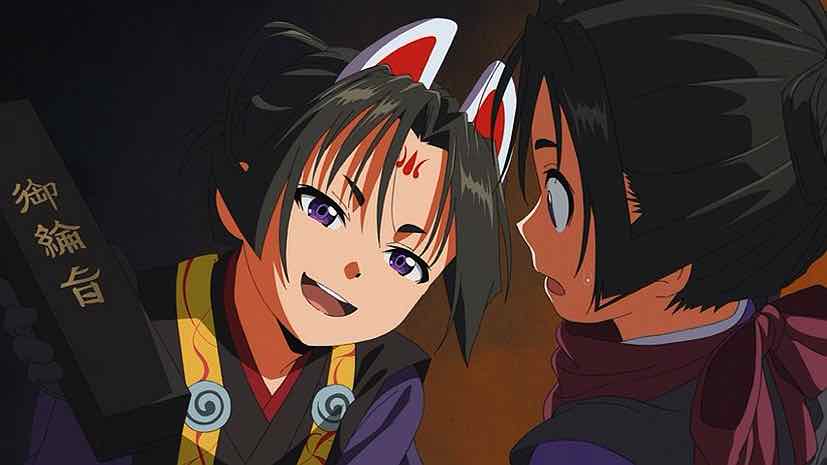As ever one to avoid burying the headline, I’ll open with the news that CloverWorks was back on their A game this week. There wasn’t a ton of horsey stuff and that certainly helps. But as long as this adaptation can avoid excessive CGI it’s clearly in good shape – there’s a ton of talent behind it. Matsui Yuusei’s signature style (almost like ukiyo-e melded with psychedelia) is hard to capture on-screen. But CW is doing a superb job trying – as with I.G. and Tengoku Daimakyou, faithfully capturing the essence of the mangaka’s style while still riffing on it in an almost impressionistic way.
There’s some unfinished business to attend to first of all. Genba and Tokiyuki have attracted the attention of Ichikawa Sukefusa (Yamamoto Takahiro), who is to ears what his lord Sadamune is to eyes. Ichikawa is a weirdo but then, pretty much every Matsui character is a weirdo so that’s not a news flash. Ayako and Koujirou are set up in the woods both to act as decoys and provide horses (uh-oh) for escape. But Ichikawa’s hearing is too sharp to be fooled – he realizes that rather than fleeing, the two boy thieves are silently hiding in the woods, waiting for the searchers to leave the premises.
Genba is an interesting one. His loyalty is to money, and seeing no obvious means to escape Ichikawa’s attentions with the young lord in tow, he decides to flee on his own. But he doesn’t realize that no one is better at fleeing – and understanding the dos and don’ts of it – than Houjou Tokiyuki. And once Tokiyuki saves him from Ichikawa’s blade – taking a slash to the back in the progress – Genba is troubled by the notion of a debt owed. He’s tried to betray Tokiyuki but the young lord is unmoved by this, and that reveals a sort of personal honor code that Genba didn’t realize he had.
Matsui is a fantasist to be sure, but his devotion to historical detail is vastly underrated. There’s some interesting context here. Personal loyalty among generals and nobles was indeed an extreme rarity in this era (and for long after) and that makes Tokiyuki stick out like a sore thumb. The notion of just what Kazama Genba is adds another interesting twist. In his village he’s a thief, but he looks to the modern eye like a ninja. That word certainly existed in the Japanese language by the 14th Century, but the broader concept of shinobi and ninjas didn’t really enter the public consciousness until a couple of centuries later.
With Tokiyuki wounded the temptation for this little ninja-thief to flee is even stronger, but somewhat surprisingly Genba elects not to. There’s a rather glaring translation error here by the way – “one cho” (about 120 yards) is translated as one meter, the distance from which Genba is shocked at the accuracy of an arrow’s flight. Genba puts all his shinobi skills to use here, creating aural distractions for Ichikawa and visual for Sadamune (setting fire to the strorehouse, which might for all Sadamune knows still contain the Imperial command at the heart of all this). He also snips Sadamune’s bowstring, which renders him rather ineffectual as a combatant in these circumstances.
With that, it’s mission accomplished. Not only has the theft of the Imperial command bought Suwa time, so many bogus claims for reward in the “liberation” of Kamakura have swamped the Emperor that he’s declared the status quo be frozen in place. Yorishige congratulates Tokiyuki for succeeding both in his mission and in winning over Genba to his cause. Koujirou suggests that Genba’s skills (at the moment mostly being applied to unleashing chaos at the victory party) could be brought to bear in assassinating Ashikaga Takauiji himself (indeed, the earliest ninja-style missions on record are assassinations). But Yorishige declares this impossible – Takauji is no mere general to be taken down in such a fashion – and asks Tokiyuki whether he really is ready to take on such an ethereally powerful opponent.
Lastly a reminder of just how formidably terrifying Takauji is, and a full-on demonstration of the visual flair this production team is capable of. Prince Moriyoshi (Suzuki Ryouta) – a crucial figure during the Genkou War and its immediate aftermath – is the son of Emperor Go-Daigo (the one behind the overthrow of the Houjou). But Moriyoshi distrusts Takauji’s loyalty to the emperor, and gathers a band of loyalists around him. Moriyoshi is formidable, but Takauji is clearly unmoved by him – which he demonstrates in a rhapsody of violence that’s at once elegant and horrifying in its depiction. It’s a clever and effective means of reminding us just what Tokiyuki is up against, and why even Yorishige professes no confidence that he can be easily defeated.
The post Nige Jouzu no Wakagimi (The Elusive Samurai) – 06 appeared first on Lost in Anime.




